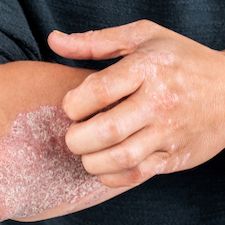Study Identifies 24 Adverse Events Associated with Secukinumab Treatment
Despite most adverse events of special interest being deemed mild to moderately severe in nature, these types of events have been increasingly reported in real-world practice.

A new systematic review of secukinumab-induced adverse events of special interest (AESI) in patients with moderate to severe plaque psoriasis found that the most common AESI were inflammatory bowel disease, eczematous drug eruption, drug-associated vasculitis, and drug-induced lupus erythematosus.
Despite most AESI being deemed mild to moderately severe in nature, these types of events have been increasingly reported in real-world practice.
Additionally, the adverse effect profile of the treatment has not been fully described in previous research, and many of the adverse effects such as lupus erythematosus had not been identified in clinical trials despite gradually being reported in more case reports and case series.
As such, an investigative team led by Jingyao Liang, PhD, Institute of Dermatology at Guangzhou Medical University, China, perfomed a systematic review intended to establish a secukinumab-induced AESI profile and management strategies.
The literature search was performed in PubMed databases from the earliest cases of secukinumab use to August 2021 for the treatment of any type of clinical condition.
Search terms such as secukinumab or secukinumab-induced, adverse effects, side effects, and adverse events were used to find relevant studies, at which point investigators extracted data regarding study type, demographics, treatment history and dosage, disease type, onset of AESI, and management and outcomes of AESI.
Overall, the search resulted in 1426 potentially relevant articles, 55 of which were included in the review. Among these studies were 2 clinical studies, 2 reviews, 50 case reports, and 1 case series, all of which were published between 2016 and 2021.
Investigators noted that more thab 1077 adult patients 18-74 years old experienced AESi after being treated with secukinumab for a myriad of conditions including psoriatic disease and spondyloarthritis (SpA).
The onset of the AESI ranged from 2 days to 96 weeks, and a total of 24 AESI were identified, including adiposity, alopecia areata, bullous eruption, scleroderma, and the AESI previously listed.
The most commonly reported AESI was IBD with over 1000 cases, followed by eczematous drug eruptions at 30 cases and drug-associated vasculitis at 8 cases.
As mentioned, most of the events were mild to moderate in severity, and patients typically experienced full recovery following discontinuation. Notably, some patients continued secukinumab treatment due to significant disease regression, with AESI being stabilized and/or well-controlled by other treatments.
With this study, investigators suggested that clinicians “should be aware that secukinumab may cause various AESI and follow-up patients for exacerbation of symptoms or new onset of AESI during treatment".
The study, "Review of secukinumab-induced adverse events of special interest and its potential pathogenesis," was published online in Dermatologic Therapy.